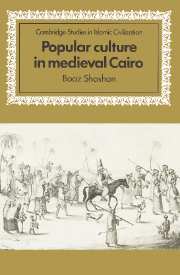Book contents
- Frontmatter
- Contents
- Preface
- List of abbreviations
- List of short references to frequently cited works
- Note on transcription and dates
- Introduction
- 1 Sufism and the people
- 2 Al-Bakrī's biography of Muḥammad
- 3 The festival of Nawrūz: a world turned upside down
- 4 The politics and “moral economy” of the Cairene crowd
- 5 Popular culture and high culture in medieval Cairo
- Appendix: Sufi shaykhs in Mamluk Cairo
- Notes
- Select bibliography
- Index
4 - The politics and “moral economy” of the Cairene crowd
Published online by Cambridge University Press: 24 September 2009
- Frontmatter
- Contents
- Preface
- List of abbreviations
- List of short references to frequently cited works
- Note on transcription and dates
- Introduction
- 1 Sufism and the people
- 2 Al-Bakrī's biography of Muḥammad
- 3 The festival of Nawrūz: a world turned upside down
- 4 The politics and “moral economy” of the Cairene crowd
- 5 Popular culture and high culture in medieval Cairo
- Appendix: Sufi shaykhs in Mamluk Cairo
- Notes
- Select bibliography
- Index
Summary
The early years of the fourteenth century witnessed a power struggle between the young sultan an-Nāṣir Muḥammad, son of Qalāwūn, now in his early twenties and reigning for the second time, and two leading emirs, Baybars al-Jashnikīr and Sayf ad-Dīn Salār. In this conflict, we read in our sources, “the people's hearts were with the sultan”. In 1308, when an-Nāṣir's plot to rid himself of his two rivals was uncovered and rumours of revenge were in the air, the people of Cairo marched toward the Citadel. In a matter of a few hours the crowd swelled, and as the word came that an-Nāṣir was planning to abdicate, the commoners expressed their discontent. The reason for that, we are informed, was two-fold. First, as already noted, they simply felt an attachment to their ruler. Second, and this is quite revealing, they desired to see the Qalāwūnid dynasty, namely, the descendants of Sultan Qalāwūn (r. 1279–90) – two of whom they had already cheered for as rulers – stay in power. They were opposed to the possibility that an “ordinary Mamluk” (aḥadmin al-mamālīk) would ascend to the throne. The crowd gathered in the streets of Cairo, shouting slogans in favour of the sultan (yā nāṣir, yā manṣūr).
As troops were sent by the two rebelling emirs to disperse the demonstrators, more slogans were heard, this time condemning the “traitors” (Allāh yakhūnu' l-khā'in, Allāh yakhūn man yakhūn ibn Qalāwūn).
- Type
- Chapter
- Information
- Popular Culture in Medieval Cairo , pp. 52 - 66Publisher: Cambridge University PressPrint publication year: 1993



